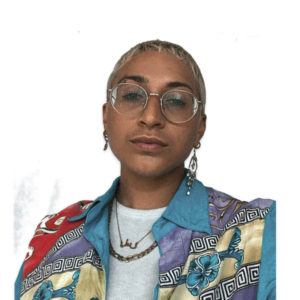 This post was written by Azad Namazie, who attended the 2023 DLF Forum as a Forum Fellow. The views and opinions expressed in this blog post are solely those of the author and do not necessarily reflect the official policy or position of the Digital Library Federation or CLIR.
This post was written by Azad Namazie, who attended the 2023 DLF Forum as a Forum Fellow. The views and opinions expressed in this blog post are solely those of the author and do not necessarily reflect the official policy or position of the Digital Library Federation or CLIR.
Azad Namazie is a digital preservationist in training and mixed media artist pursuing their MLIS at UCLA on the Informatics and Special Collections track. They are interested in the preservation and management of mixed media collections (born-digital, oral history, AV, ephemeral) and collection data with a critical eye toward privacy, access, consent, and affect. Post-grad, they would like to do digital preservation and content management work for cultural heritage institutions. Currently, they work at the UCLA Center for Oral History Research and the Digital Library Program. They are also an incoming Andrew W. Mellon Community Archives Fellow at the Skid Row History Museum and Archive. Previously, they have worked at the Los Angeles County Museum of Art (LACMA) and Los Angeles Public Library (LAPL). Other interests include: soccer, visual poetry, sci fi/fantasy novels, shoegaze, cardamom tea, esoteric escapades, and full moons.
The 2023 DLF Forum marked my first entrance into professional conferences as a memory worker and archivist in training. Amidst an abundance of knowledge-sharing and skill-building experiences, I gained a profound appreciation for spaces transcending institutional and professional boundaries.
Two presentations resonated deeply with me: Ruth Carpenter’s “Digital Storytelling with Podcasts” and Anne Ray’s “News from the Inside: Building a Digital Archive of Prison Newspapers as an Act of Resistance, Liberation, and Bibliography.” Ruth’s demonstration of an Audacity software lesson plan, developed for their students at Binghamton University, left me wondering about the potential of digital products as teaching and learning tools that center end-user experiences and challenge standards-based digital literacy discourses. Anne Ray’s presentation on the American Prison Newspapers (1800s-present) open access collection underscored the importance of slowness as a methodology and care ethic in designing metadata and access workflows that honor the radical, militant character of prison journalists and their records.
These sessions not only delved into technical standards but also emphasized the material conditions of digital archival labor and the care work required to support end users, often overshadowed by the hype surrounding new digital products and neoliberal claims to neutrality. As information workers, we actively shape history and memory through the political act of stewardship, notably in digital environments. Thus, we would be remiss to not contextualize our archival labor within the present political moment.
During a lunchtime discussion with a colleague, we discussed the Israeli apartheid regime’s genocidal attacks on Palestinian memory, cultural heritage, and information access to normalize colonial violence and, ultimately, make the land uninhabitable. We explored ways information workers can protect and safeguard Palestinian cultural heritage, from inviting censored Palestinian cultural workers and scholars for speaker series, developing teach-ins on information security methods for folks speaking out against settler colonialism and racial apartheid, and pushing for institutional divestment from Israel. The benefit of spaces like the DLF Forum lies in creating cross-institutional connections with information workers invested in political organization, sharing tactics, and unearthing the contradictions in our digital library applications without fear of censorship, retaliation, or professional loss, which is an unfortunate reality of US academic institutions.
In light of these experiences, I will continue to ponder the following questions: what happens when access and cultural heritage cease to be ethical priorities in our digital library project communities? What bold actions must we take to disrupt governance structures and, ultimately, activate and care for our records? These questions underscore the imperative for information workers to confront ethical dilemmas within digital library project communities head on and take proactive measures to uphold principles of care work and intentional practice.
